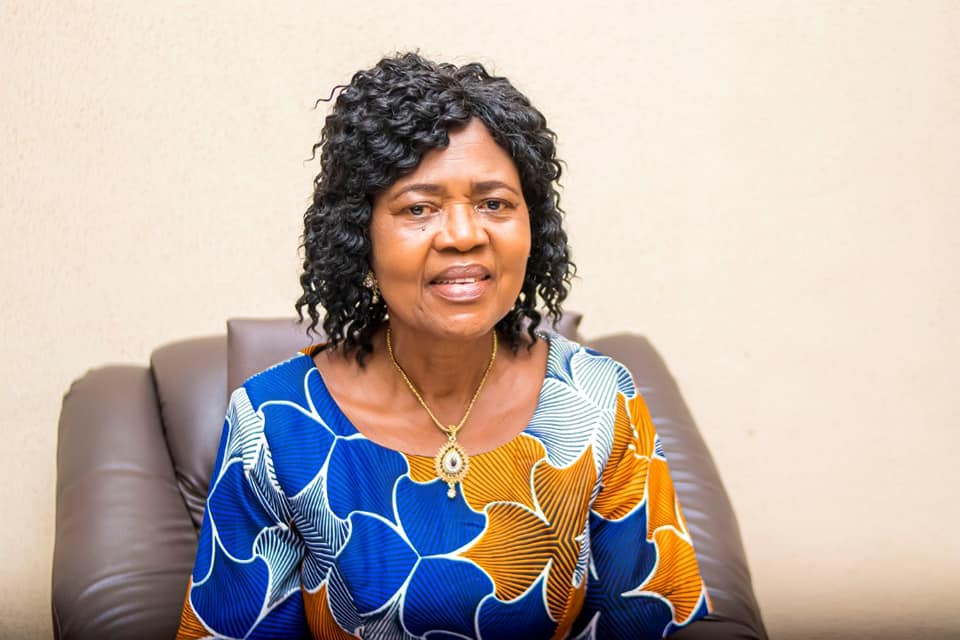Akachi Adimora-Ezeigbo’s My Cousin Sammy is written for younger teenagers. It is made up of 101 pages of narration in ten chapters with additional pages for Word Study and Activities that bring the book to 113 in page count.
By Lechi Eke
While the blurb on this children’s book’s back is concerned with the book’s dealing with migration of rural dwellers to the city, my focus in reviewing this 2017 Nigeria Prize for Literature winner novel is its theme of loving our neighbours as ourselves. This, the narrator displays unabashedly in the story, and her mother later latched onto it.
My Cousin Sammy is written for younger teenagers. It is made up of 101 pages of narration in ten chapters with additional pages for Word Study and Activities that bring the book to 113 in page count.
It is written in the first-person point of view and narrated through the eyes of an 11-year-old girl. This greatly influences the diction which is simple and easy to read English language suitable for younger teenagers. The book opens with a dream Ene, who believes that her dream always come true, has about a little boy who looks sad and underprivileged. This signifies to me that a utopian family relationship is mostly a dream which as adults we can make become a reality.
Eleven-year-old Ene Mark-Metu lives with her parents and older brother, Adaka. They have a driver named John and a help who goes by the name Grace. Her father is an engineer who works with an oil company in Lagos and her mother owns a boutique and a supermarket. Her 12 years old brother is in the first year of junior secondary school, while Ene is in primary 6. From what we learnt in the book, her mother is still trying for another child or children.
Ene’s dad has a brother called Uzoka who is married with two children, a boy named Sammy and a girl named Ada just like his older brother, Onyibe Mark-Metu, Ene’s dad. While Ene’s family lives in Lagos, Sammy’s family lived in Agatu, a place in Benue state, before his parents died in a ghastly motor accident.
So, Sammy, Ene’s cousin is an orphan. By the misfortune of losing his parents in an accident, Sammy and his sister become separated. Sammy comes to live with his father’s brother, Ene’s dad, in Lagos while his sister lives in Otukpo in Benue state with their mother’s brother.
Here, I will quote the book’s blurb. Ene’s family is “a middle-class family with middle class prejudices and pretensions.” Yes, that’s a perfect description of Ene’s family whom the orphaned Sammy joins in Lagos from the village of Agatu.
Ene and her brother call their parents Dad and Mum while Sammy and his sister call their parents, who were teachers, Papa and Mama. Ene’s family spends their Christmas holidays in Lagos or London, while Sammy’s family used to spend theirs either in his mother’s village or in his father’s village. Sammy’s family speaks Igbo (his father’s language), Idoma (his mother’s language) and poor English; his host family speaks only Queen’s English. The host family eats different kinds of foods including spaghetti which Sammy hates saying it looks like worms, while Sammy is used to swallow, soups and rice.
READ ALSO:
Book Review: “Beyond the Boundaries” creates new memories
This family of four receives Sammy with mixed reactions. Ene who’s had a dream about Sammy before their father told them, welcomes him with open arms and immediately wants to be his friend when he arrives. But Ene’s brother, Adaka, doesn’t seem to like Sammy at all because Sammy comes from the village and has some uncivilised mannerisms. He’s also shy and timid. To worsen matters, Sammy’s uncle’s wife doesn’t like Sammy either.
The orphan boy senses this dislike in his uncle’s wife and in Adaka. One taunts him and the other shouts at him. So, it is a rough start of a new life for a boy whose parents just died. This makes him unhappy and self-conscious. Sammy’s challenges with the kind of food they eat must add to his burden because his uncle’s wife has warned him that he will go hungry if he rejects what they serve at the table. He’s also battling with fear of death and darkness which makes him run to Ene’s room for refuge one night.
Ene’s mum doesn’t want to hear the reason why he’s in Ene’s room but warns him harshly never to sleep in her daughter’s room. So, Ene is Sammy’s only friend in the house. She befriends him, sneaks into his room after supper and learns things about her new cousin from him. For example, he owns both an Igbo Bible and an Idoma Bible. His parents taught him and his sister how to read and write Igbo, Idoma and English and communicated with them in these three languages. Also, Sammy reads his Bible and prays every day.
Contrary to Ene’s expectation that Sammy would join her in her school, her dad enrols him in a government school while she and her brother attend a private school. They are chauffeur-driven to school while Sammy who is new in Lagos walks to the bus stop to take public transport to school.
The two cousins and friends, Ene and Sammy, have fun and play together, going to help their help in the kitchen, reading together, learning Igbo (Sammy teaching Ene) and English (Ene teaching Sammy because he speaks English with wrong intonation perhaps), going out to raid mango trees, and so forth.
After a while, a dark cloud appears on the horizon. Sammy goes to school one day and does not return home. They look for him everywhere and cannot find him. They report to his school and the police, also. Ene is heartbroken and frightened. But by evening of the second day, a stranger brings Sammy home. He says he has seen the eleven-year-old diminutive boy wandering near Marine Beach.

After this incident, Sammy begins to lie. Ene believes that Sammy has learnt how to lie from the street boys he met while missing who robbed him of his school bag, shoes and uniform. But Sammy says he lies to Ene’s mum because he is afraid of her and knows she doesn’t like him. Of course, Ene’s dad whips him with a cane and makes him promise never to lie in his house again and he promises.
The story begins to wrap up with the incident of the family help, Grace, losing her mother and going away leaving Ene’s mum to do all the house chores. Soon after, Ene’s mum falls sick and has to go into hospital for an operation. It turns out she lost a pregnancy and falls into depression. During this time, the children take turns in the kitchen preparing dishes and cleaning the house and sleeping with Ene’s mum in the clinic. The work is so much that Ene’s dad has to travel to his village, Ovom, to bring their grandma to help around the house and to look after them while he is at work.
Mrs Mark-Metu returns home from hospital very weak and very unhappy. The children are happy to see her, including Sammy who calls her Mum instead of Auntie, for the first time. They begin to think of how to make her happy. Sammy gets an idea and shares it with his cousins.
So, one night, he dresses up funny for her and dances and sings for her in a game they play at Ovom village. Their grandma, Adaka, dad and finally their mum laugh so much that tears run down their eyes. The laughter heals Ene’s mum. Her mother-in-law thereafter advises her to stop worrying about having more children because God has given her three already in Adaka, Ene and Sammy. And if she wants more, the old woman tells her, she should send for Sammy’s sister who’s not being well cared for in Otukpo town.
Ene’s mother heeds to her mother-in-law’s advice. She calls her three children together and breaks the good news to them of Sammy’s sister, Ada, joining them soon, so they will become one big happy family. She also tells them that Sammy will change to Ene’s private school the following term.
These are Ene’s dreams come true. She wanted a playmate, now, she’s getting two. She wanted Sammy to be in her school, she’s getting it. At the end of the day, a little girl’s love conquers all. Her dreams come true being made possible by adults loving their neighbour as themselves. Love conquers all!
The end.
Reviewer’s Note: Dear parents, please, treat children under you as yours. There’s a blessing in it. The joy it brings heals both your heart and your body. Let’s not mistreat orphans.
Dear reader, did you notice that without our narrator saying anything about why the orphan boy has to go to public school, or takes a bus while his cousins ride on cars, at the end of the story, we found out why? This style of story-telling is called Reportage. The narrator leaves the reader to draw their own conclusion.
Literary Appreciation
This story points us to societal change, how to be a change agent: lending a helping hand and making the world liveable for others, one good deed at a time.
Characterisation is great. Ene is a stock character: she’s the good personality that brings good to others. We see some character development: changes in the characters of Adaka who dislikes Sammy at the beginning of the story, but later tolerates him, Mrs Mark-Metu who changes and accepts Sammy as her son, and even announces that Sammy will change to her daughter, Ene’s, school. Ene’s dad, on the other hand, is a character who seems to be under the influence of his wife. Ene’s grandmother is a good woman who uses suggestions or good advice, instead of force to appeal to her daughter-in-law. Unlike some mothers-in-law, she does not force her daughter in-law to accept her other grandchildren, but advises her on the best actions to take.
Ene’s mother is not a bad person. She represents what majority of married women would do in that circumstance. Ezeigbo, in introducing a good mother-in-law, moves the story forward through the good counsel of a good woman.
Most touching of all is Sammy’s character. We see a good Christian boy who prays and reads the Bible begins to tell lies because he “fears” his guardian and knows she doesn’t like him. We see how our hate can influence people to do bad. Ezeigbo also shows through the treatment of Sammy’s lie-telling and punishment, that if we apply the rod, we save the child as the Good Book (Bible) tells us.
Mr Onyibe Mark-Metu is not a weak character, rather he shows strength of wisdom in handling happenstance that befalls his home. He wants peace in his home and knows he is to dance to the tune of his wife, giving her time to come to terms with taking care of another woman’s child. If he has not handled the situation with care, he would have had what is called “a storm in a teacup.”
The plot structure is believable, starting with a dream which turns into the reality of a stranger (Sammy) joining a family, to how the family receives him and how he tries to adapt with or acclimatise to living in a strange environment. The story moves from the rough patches of accepting the stranger and the stranger adapting to his new home to some difficulties that threaten this co-existence moving the story to circumstances that bring about the resolution of the conflicts in the story.
Also, we learn through the plotting of the story how street children come about. Just in case you ever wondered.
Simple diction sets the setting (mood) of the story that it is a children’s story full of childish excitement as shown by the narrator’s words, her talkativeness, inquisitiveness, demands and expectations. The physical setting is Lagos, a cosmopolitan city which goes well to expose the timidness and rustic behaviour of a boy from the rural area. Urban and rural dwellers don’t behave the same way.
In general, My Cousin Sammy is a good story teaching us to love our neighbour as ourselves, to do good and share our good fortunes with others cheerfully.













